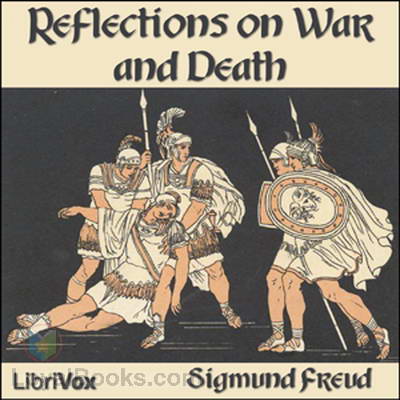|
Books Should Be Free Loyal Books Free Public Domain Audiobooks & eBook Downloads |
|
|
Books Should Be Free Loyal Books Free Public Domain Audiobooks & eBook Downloads |
|
Reflections on War and Death |
|---|

Reflections on War and Death by Sigmund Freud is a thought-provoking and insightful collection of essays that explore the psychological effects of war and the nature of death. Freud delves into the complexities of human aggression and violence, offering a psychoanalytic perspective on the causes and consequences of war.
One of the most striking aspects of the book is Freud's exploration of the concept of the "death drive" and its role in human behavior. He argues that an inherent drive towards self-destruction and aggression is present in all individuals, leading to destructive behaviors such as war. Freud's analysis of the psychological mechanisms underlying war sheds light on the deep-rooted nature of conflict and violence in human societies.
Another compelling aspect of the book is Freud's exploration of the impact of war on individuals and society as a whole. He discusses the psychological trauma and collective guilt that can result from experiencing or participating in war, shedding light on the lasting effects of violence on the human psyche.
Overall, Reflections on War and Death is a profound and thought-provoking read that offers valuable insights into the dark side of human nature. Freud's psychoanalytic analysis sheds light on the complexities of war and death, offering readers a deeper understanding of the psychological dynamics at play in times of conflict. Book Description: Anyone, as Freud tells us in Reflections on War and Death, forced to react against his own impulses may be described as a hypocrite, whether he is conscious of it or not. One might even venture to assert—it is still Freud’s argument—that our contemporary civilisation favours this sort of hypocrisy and that there are more civilised hypocrites than truly cultured persons, and it is even a question whether a certain amount of hypocrisy is not indispensable to maintain civilisation. When this travesty of civilisation, this infallible state that has regimented and dragooned its citizens into obedience, goes to war, Freud is pained but not surprised that it makes free use of every injustice, of every act of violence that would dishonour the individual, that it employs not only permissible cunning but conscious lies and intentional deception against the enemy, that it absolves itself from guarantees and treaties by which it was bound to other states and makes unabashed confession of its greed and aspiration to power. For conscience, the idea of right and wrong, in the Freudian sense, is not the inexorable judge that teachers of ethics say it is: it has its origin in nothing but “social fear,” and whereas in times of peace the state forbids the individual to do wrong, not because it wishes to do away with wrongdoing but because it wishes to monopolise it, like salt or tobacco, it suspends its reproach in times of war. The suppression of evil desires also ceases, and men, finding the moral ties loosened between large human units, commit acts of cruelty, treachery, deception and brutality the very possibility of which would have been considered incompatible with their degree of culture. |
| Genres for this book |
|---|
| Non-fiction |
| Philosophy |
| Politics |
| Psychology |
| Links related to this book |
|---|
| Wikipedia – Sigmund Freud |
| Gutenberg e-text |
| eBook Downloads | |
|---|---|
|
ePUB eBook • iBooks for iPhone and iPad • Nook • Sony Reader |
Kindle eBook • Mobi file format for Kindle |
|
Read eBook • Load eBook in browser |
Text File eBook • Computers • Windows • Mac |
| Review this book |
|---|